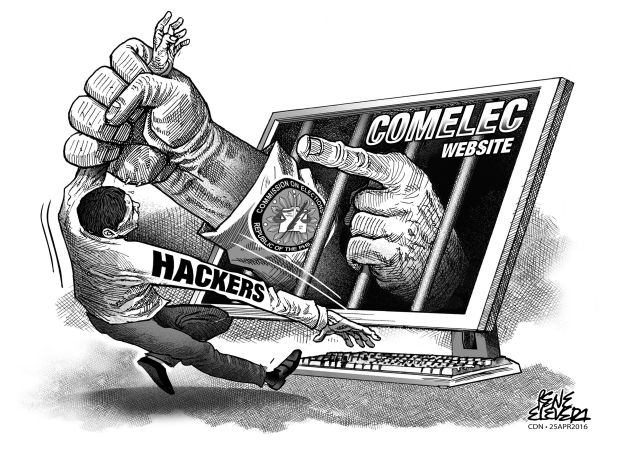
If Paul Biteng lived in China or some communist country, he wouldn’t be caught smiling or chuckling by news photographers after being arrested for defacing a government website.
More likely he would be detained in isolation, surrounded by concrete walls several inches thick and denied any communication privileges. In jail, he won’t be allowed anywhere near anything that resembles an electronic device.
He would probably be used by government for his talents in exchange for leniency but Biteng won’t be so smug knowing that he will be kept on a tight leash and then whisked away at a moment’s notice perhaps to suffer a fate worse than death.
What it means is that Biteng and hackers like him who employ their skills to take down government websites like the Commission on Elections’ (Comelec) should not only be penalized but made to appreciate the full consequences of their actions.
Reading his interview in the Philippine Daily Inquirer, one gets the impression that not only was he unrepentant but that he enjoyed doing what he did. In fact, he thought that he was doing a public service when he said that he was giving “voice to the voiceless” by defacing the Comelec website and proving wrong the poll agency’s assumption that they don’t need any additional security measures for their website and voters master list.
As it is, the defacing resulted in the alleged disclosure of voters’ names that was immediately taken down by the government. But the damage had already been done and while Biteng said he regretted that the defacing resulted in the leakage of the voters’ data, we seriously doubt his sincerity.
Since Biteng is no minor, he cannot escape prosecution and weasel his way out of prison. The consequences of his criminal act, however, may be far reaching in that hackers may use the voters’ data to tap into e-mail, credit card and bank account records that may divest ordinary citizens of their hard-earned cash.
As abominable as his criminal act is, the onus of the blame also lies squarely on the Comelec’s shoulders – that it took only an IT graduate who had nothing better to do than deface their website to show just how neglectful, irresponsible and grossly incompetent they are in securing voters’ data.
What Biteng did was not only criminal, but was also humiliating on the part of government. What prevents others like Biteng from one day poking into supposedly confidential data and using it for their own ends?
But just as importantly, Biteng’s criminal act may have set back the country’s march towards fully automated elections and provided fuel to the argument of traditional politicians for a return to the antiquated, error- and manipulation-prone manual elections.
The Comelec has no one to blame for this debacle but themselves.